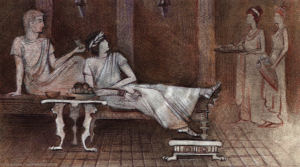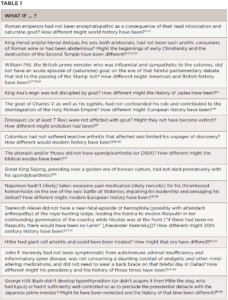
The study of rheumatology (and medicine) in art, history, literature and music is engaging and informative.1-12 In this article, we present some instances when rheumatic and autoimmune diseases in certain individuals may have affected the course of history in Western civilization.
Physicians are usually concerned, appropriately, with the effects of illness on the lives of individuals. However, medical conditions have also profoundly influenced historical events. Here, we explore how rheumatic disease may have affected historical events. Some examples listed in Table 1 (see opposite) are not discussed.
The history of rheumatology is beyond the scope of this article, but some observations are pertinent to our discussion.13-16 Representations of what we now know as osteoarthritis, gout, infectious arthritis and possibly spondyloarthritis exist in antiquity; it was only relatively recently that rheumatoid arthritis (RA) and the other rheumatic disorders, particularly the systemic rheumatic diseases, such as systemic lupus erythematosus and vasculitis, were recognized and distinguished from other disorders.5,9,11,14,16 Most experts agree that systemic rheumatic diseases were not generally recognized until about the 18th century.11
Examining the history and evolution of our identification and understanding of rheumatic disease is not only of inherent intellectual interest, but adds perspective to current thinking and practice. When and how rheumatic diseases occurred, or were first recognized, provides insights about possible etiology and pathogenesis. RA is such an example. It was first described in about 1800 CE, coinciding with an increase in sugar consumption in Europe and associated with increased periodontal disease linked to the bacteria P. gingivalis. P. gingivalis infection is recognized as a risk factor for the development of RA in certain individuals due to the bacteria’s ability to citrullinate proteins.5
Saturnine Gout, Lead Intoxication & the Fall of the Roman Empire
The culture of the Western Roman Empire, for most of its 500 years (from the first century BCE to the fifth CE), had a profound and lasting impact on the arts, science and religion. Its power declined considerably in Western Europe until the Germanic barbarian King Odoacer deposed the last Western Roman emperor in 476 CE. Causes for the fall of Rome remain controversial, and historians have posited poor leadership, weakened military power and climate change as possible reasons. But what if an important factor in the demise of the empire was lead poisoning from daily wine and food intake of the aristocracy?


